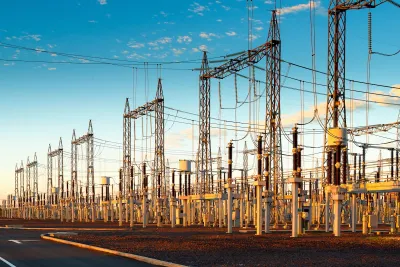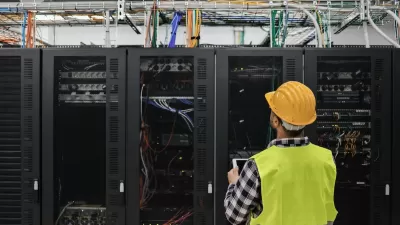Without regulatory changes, data centers’ high demand for energy would be subsidized by taxpayers, according to a new study.

A report from the Harvard Electricity Law Initiative warns that American energy consumers could subsidize the energy used by data centers by billions of dollars, reports Pam Radtke in Governing. “Data centers are forecast to account for up to 12% of all U.S. electricity demand by 2028. They currently use about 4% of all electricity.” According to one author of the report, because data centers use a disproportionately high amount of energy, “We’re all paying for the energy costs of the world’s wealthiest corporations.”
In many cases, utilities are still relying on fossil fuel-powered plants to provide the energy required by data centers. Meanwhile, the “perceived benefits” of data centers are failing to materialize. In Louisiana, “The potential costs aren’t just in bill increases, the paper points out. If utilities can profit from building new generation for data centers, they have no incentive to modernize their systems by switching to renewable or more efficient power, which would provide longer term benefits to customers and the climate.” In northeast Louisiana, a planned data center for Meta will be powered by a natural gas plant, sparking concerns about greenhouse gas emissions.
FULL STORY: Power for Data Centers Could Come at ‘Staggering’ Cost to Consumers

Maui's Vacation Rental Debate Turns Ugly
Verbal attacks, misinformation campaigns and fistfights plague a high-stakes debate to convert thousands of vacation rentals into long-term housing.

Planetizen Federal Action Tracker
A weekly monitor of how Trump’s orders and actions are impacting planners and planning in America.

In Urban Planning, AI Prompting Could be the New Design Thinking
Creativity has long been key to great urban design. What if we see AI as our new creative partner?

King County Supportive Housing Program Offers Hope for Unhoused Residents
The county is taking a ‘Housing First’ approach that prioritizes getting people into housing, then offering wraparound supportive services.

Researchers Use AI to Get Clearer Picture of US Housing
Analysts are using artificial intelligence to supercharge their research by allowing them to comb through data faster. Though these AI tools can be error prone, they save time and housing researchers are optimistic about the future.

Making Shared Micromobility More Inclusive
Cities and shared mobility system operators can do more to include people with disabilities in planning and operations, per a new report.
Urban Design for Planners 1: Software Tools
This six-course series explores essential urban design concepts using open source software and equips planners with the tools they need to participate fully in the urban design process.
Planning for Universal Design
Learn the tools for implementing Universal Design in planning regulations.
planning NEXT
Appalachian Highlands Housing Partners
Mpact (founded as Rail~Volution)
City of Camden Redevelopment Agency
City of Astoria
City of Portland
City of Laramie





























